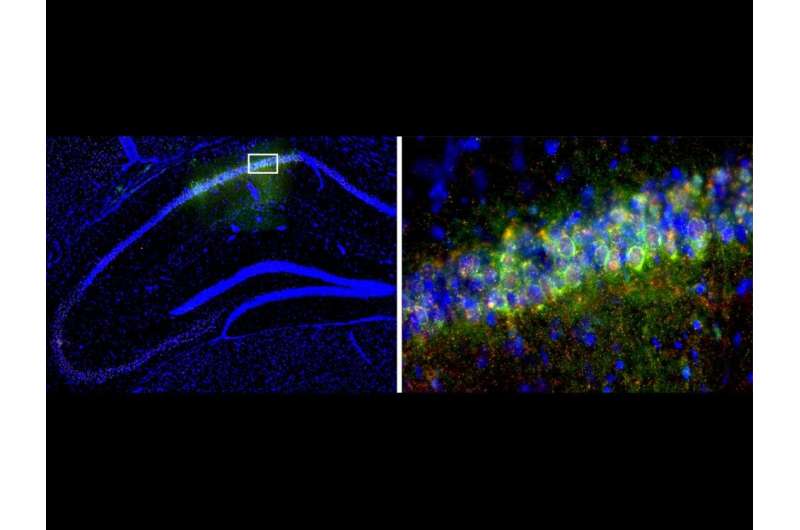This article has been reviewed according to Science X's editorial process and policies. Editors have highlighted the following attributes while ensuring the content's credibility:
fact-checked
peer-reviewed publication
trusted source
proofread
Circadian clock gene helps mice form memories better during the day

A gene that plays a key role in regulating how bodies change across the 24-hour day also influences memory formation, allowing mice to consolidate memories better during the day than at night. Researchers at Penn State tested the memory of mice during the day and at night, then identified genes whose activity fluctuated in a memory-related region of the brain in parallel with memory performance.
Experiments showed that the gene, Period 1, which is known to be involved in the body's circadian clock, is crucial for improved daytime memory performance. A paper describing the research was published online in the journal Neuropsychopharmacology.
The research demonstrates a link between the circadian system and memory formation and begins to piece together the molecular mechanisms that help form and keep memories. Understanding these mechanisms and the influence of time of day on memory formation could help researchers to determine how and when people learn best.
"The circadian system, which regulates physiological changes in our bodies across the 24-hour day, is shared across most organisms and is primarily controlled in a region of the brain called the superchiasmatic nucleus," said Janine Kwapis, assistant professor of biology in the Eberly College of Science at Penn State and leader of the research team.
"This system also influences day/night oscillations in other regions of the brain, including the dorsal hippocampus, one of the regions where memories are formed. Because memory formation is better during the day in many organisms, we were interested in understanding the molecular mechanisms that link the circadian clock to memory."
The researchers tested the memory of the mice using an object memory location task that has been shown to specifically require the dorsal hippocampus. Essentially, the mice are exposed to two identical objects in specific locations. Later, the mice are again exposed to the objects, but one of them has been moved. If the mice then investigate the moved object more than the one that is still in its original location, it suggests that they remember the original configuration.
"Mice that were exposed to the memory location task during the day formed stronger long-term memories than mice exposed to the task at night," said Lauren Bellfy, a graduate student in Kwapis' lab and the first author of the paper. "We were then interested to know which stage of the memory formation process was being impacted by time of day."
Long-term memory formation is often broken down into three phases. First, there is memory acquisition when the information is initially learned. Then the memory must be consolidated, during which molecular changes occur causing cellular and synaptic modifications in the brain that store the memory. Finally, to be useful, the memory must be retrieved at some later time.
The research team designed experiments that allowed them to show that memory acquisition and memory retrieval were not impacted by time of day, suggesting that memory consolidation was the main driver in the differences they saw in memory performance between day and night.
"Memory consolidation requires active molecular changes in neurons that result in synapse growth or remodeling," said Kwapis. "These changes are driven by changes in gene activity or expression, so we isolated and sequenced all the genes being expressed in the dorsal hippocampus of mice that had been trained in the memory location task during the day or at night."
Many genes fluctuate their activity across the day/night cycle independent of learning or memories, so the team compared the gene activity of the mice trained during the day and at night to these regular fluctuations. They found a dramatic increase in gene activity in the animals that were exposed the memory task during the day, whereas the expression of many fewer genes were changed in the mice trained at night. One gene in particular that was expressed at high levels during the day but reduced at night was the clock gene, Period 1.
This gene was already known to play a crucial role in the circadian system in the superchiasmatic nucleus. What was exciting to the researchers was that this gene seems to function independently to regulate memory in the hippocampus, suggesting it "moonlights" to regulate memory consolidation across the day/night cycle.
"Our lab had already been studying the role of the Period 1 gene in memory formation, but we didn't know what role this gene was playing," said Bellfy. "Here, we found evidence that Period 1 seems to regulate memory based on the time of day. When we shut down the activity of Period 1 in the dorsal hippocampus, we saw that these mice had impaired memory but most aspects of the circadian system still functioned normally."
The team plan to continue investigating other genes whose activity was changed following learning.
"This work shows that Period 1 plays at least two important roles in the brain," said Kwapis. "It was identified because of its role in regulating the circadian clock, but it appears to be equally important in memory formation.
"Understanding how memories form at this molecular level could help us to better understand memory-related disfunctions and potentially develop ways to address them. The connection between the circadian clock and memory formation could also be important for understanding how and when people learn best."
More information: Lauren Bellfy et al, The clock gene Per1 may exert diurnal control over hippocampal memory consolidation, Neuropsychopharmacology (2023). DOI: 10.1038/s41386-023-01616-1


















